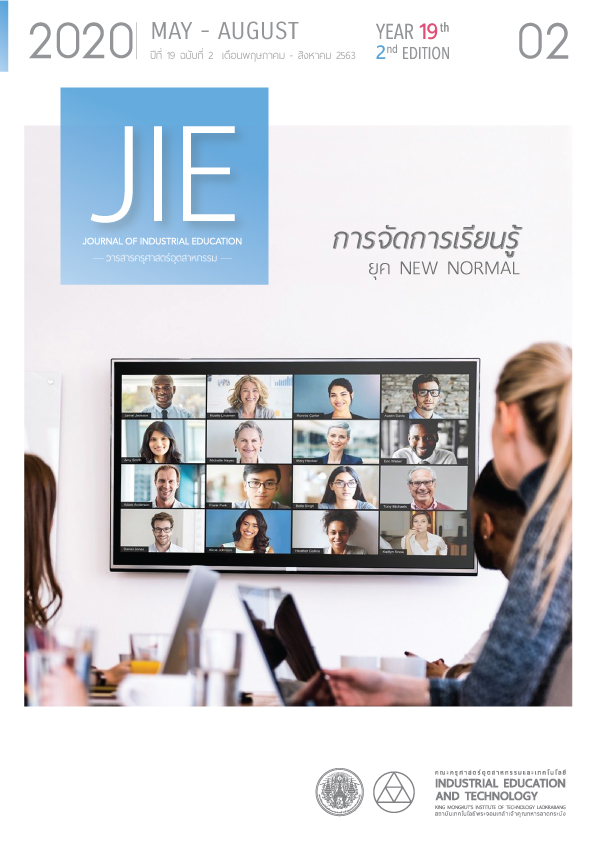การใช้สื่อสังคมออนไลน์ประกอบการจัดการเรียนรู้รายวิชาจิตวิทยาวัยเด็กในโรงเรียน
คำสำคัญ:
สื่อสังคมออนไลน์, รายวิชาจิตวิทยาวัยเด็กในโรงเรียน, ความฉลาดทางอารมณ์บทคัดย่อ
การวิจัยครั้งนี้ มีวัตถุประสงค์ ศึกษาการใช้สื่อสังคมออนไลน์ประกอบการเรียนรู้ ในรายวิชาจิตวิทยาวัยเด็กในโรงเรียน กลุ่มตัวอย่างที่ศึกษาคือ นิสิตที่ลงทะเบียนเรียนวิชา จิตวิทยาวัยเด็กในโรงเรียน (01166461) มหาวิทยาลัยเกษตรศาสตร์ ภาคปลาย ปีการศึกษา 2562 หมู่เรียนที่ 1 จำนวน 25 คน ซึ่งได้มาจากการสุ่มอย่างง่าย การวิจัยนี้เป็นการวิจัยกึ่งทดลอง เครื่องมือที่ใช้ในการดำเนินการวิจัย ได้แก่ 1. แบบสอบถามความสนใจในการเข้าร่วมกิจกรรมโดยใช้สื่อสังคมออนไลน์ของนิสิต 2. แผนการจัดกิจกรรมการเรียนรู้รายวิชาจิตวิทยาวัยเด็กในโรงเรียน หน่วยความฉลาดทางอารมณ์ 3. แบบสอบถามความพึงพอใจของนิสิตที่เข้าร่วมกิจกรรม4. ข้อสอบรายวิชาจิตวิทยาวัยเด็กในโรงเรียน หน่วยความฉลาดทางอารมณ์ โดยเครื่องมือทั้งหมดได้ผ่านการตรวจสอบคุณภาพ มีค่าความเขื่อมั่นระหว่าง .86-1.0 การวิเคราะห์ข้อมูลโดยใช้สถิติการแจกแจงความถี่ ร้อยละ ค่าเฉลี่ย ส่วนเบี่ยงเบนมาตรฐาน ทดสอบความแตกต่างของคะแนนโดยใช้สถิติ Paired-Sample t-test
ผลการวิจัยพบว่า 1. ความสนใจของนิสิตในการเข้าร่วมกิจกรรมการเรียนรู้โดยใช้สื่อสังคมออนไลน์ พบว่า นิสิตมีความสนใจในการเข้าร่วมกิจกรรมเป็นกลุ่มเพื่อการแลกเปลี่ยนเรียนรู้ การใช้แบบประเมินออนไลน์เพื่อการรู้จักตนเอง การศึกษาค้นหาความรู้จากสื่อออนไลน์ 2.แผนการจัดกิจกรรมการเรียนรู้มีความครบถ้วน ครอบคลุมการใช้สื่อสังคมออนไลน์ตามความต้องการของนิสิต โดยผ่านการตรวจสอบความตรงเชิงเนื้อหาจากผู้เชี่ยวชาญ และคะแนนความฉลาดทางอารมณ์ของนิสิตที่เข้าร่วมกิจกรรมหลัง การทดลอง ( = 13.26) สูงกว่า ก่อนเข้าร่วมการทดลอง (
=11.91) อย่างมีนัยสำคัญ ที่ 0.05 3.นิสิตมีความพึงพอใจเกี่ยว สิ่งที่ได้รับจากการเข้าร่วมกิจกรรมระดับมากที่สุด มี 2 ด้าน ตามลำดับคือ กิจกรรมที่จัดขึ้นช่วยนิสิตได้สะท้อนคิดเป็นรายบุคคล การเข้าร่วมกิจกรรมช่วยให้นิสิตมีแนวทางพัฒนาความฉลาดทางอารมณ์ให้แก่ตนเองซึ่งประโยชน์ที่ได้รับจากการวิจัย จะเป็นแนวทางในการจัดกิจกรรมการเรียนรู้ที่สอดคล้องกับสภาพสังคมและรูปแบบการเรียนของผู้เรียนในยุคปัจจุบัน
เอกสารอ้างอิง
Iamkongsi S. 2018. Classroom Management in the 21st Century. Bangkok: Triple Education
Higher Education Commission. (2019). Guidelines onImplementing the National Qualifications Framework for Higher Education on Digital Literacy for Bachelor’s Degree.Retrieved December 2, 2019, from http://edu.vru.ac.th/main/wp-content/uploads/2019/01/2561-12-27-digitalbase.pdf.
Amornwiwat S. Teacher Education and Challenging Changes. Bangkok: Watcharin P.P.
Ministry of Education. (2013) Ministry of Education Urgesthe Teachers to Adjust their New Rolesto Keep up with Technology in Order to Teach Students.Retrieved December 2, 2019, from http://www.moe.go.th
Vanichbuncha K. 2001. Statistical Analysis: Statistics for Decision Making. 5th edition. Bangkok: Thammasarn Company.
Sarawanawong J. et al. 2016. Online Social Media Usage Behaviors of Undergraduate Students, Kasetsart University. Journal of Library and Information Science Srinakharinwirot University.10(2) July- December . 2016.p17-31
Pratoom N. 2015. Guidline for Using Online Social Network in A Studio Art Program of Undergraduate Students.Master Degree of Education Thesis in Art Education, Chulalongkorn University.
Rattanathamrongpun T. et al. 2015. A Study of Behavior and Impact of Using Online Social Network Chulabhron (Ladkwang) Technical College Students. [online]. Journal of Industrial Education. 14(2) May-August 2015. p305-311. http://161.246.14.29/journal/images/stories/year14_2/vol14_02_41.pdf
White, C. M. 2012. Social media, crisis communication, and emergency management: Leveraging web 2.0 technologies. Boca Raton, FL: CRC Press.
Nitipornmongkhon P. 2015. Social Networks Usage of Working People in Bangkok. Journal of Industrial Education. Faculty of Education, Srinakharinwirot University, Volume 9 No 2 July-December 2015.p63-71
Bangthamai E. 2015. The Development of Learning and Teaching Activities Through Online Social Networking to Promote Creative Internet Using for Students in Tertiary Level. Faculty of Education, Silpakorn University. Nakhonpathom.
Satiman, A. 2007. Effects of Project-best Learning Activities via Internet on Self-Direct Learning and Achievement Higher Education Student. A Thesis of Doctoral Degree of Education (Education Technology) Graduate school Srinakarinwirot University, Bangkok.
Saiplang J. 2017. A Development of Mobile Learning on Process Modeling for System Analysis and Design. [online]. Journal of Industrial Education. 16(1)January-April 2017. p.25-33. http://161.246.14.29/journal/images/stories/year16_01_03.pdf
Damjub W. 2019. Social Media for Teaching and Learning in the 21st Century. Journal of Liberal Arts Maejo University. Vol7.No2. July - December 2019. P.143-159
Thanakijcharoensuk T. 2016. The Development of Ubiquitous Learning Model Via Online Social Media for Undergraduated Students. Journal of Education SWU. 17(1) January-June. p16-23
ดาวน์โหลด
เผยแพร่แล้ว
รูปแบบการอ้างอิง
ฉบับ
ประเภทบทความ
สัญญาอนุญาต
ลิขสิทธิ์ (c) 2020 วารสารครุศาสตร์อุตสาหกรรม

อนุญาตภายใต้เงื่อนไข Creative Commons Attribution-NonCommercial-NoDerivatives 4.0 International License.
"ข้อคิดเห็น เนื้อหา รวมทั้งการใช้ภาษาในบทความถือเป็นความรับผิดชอบของผู้เขียน"



